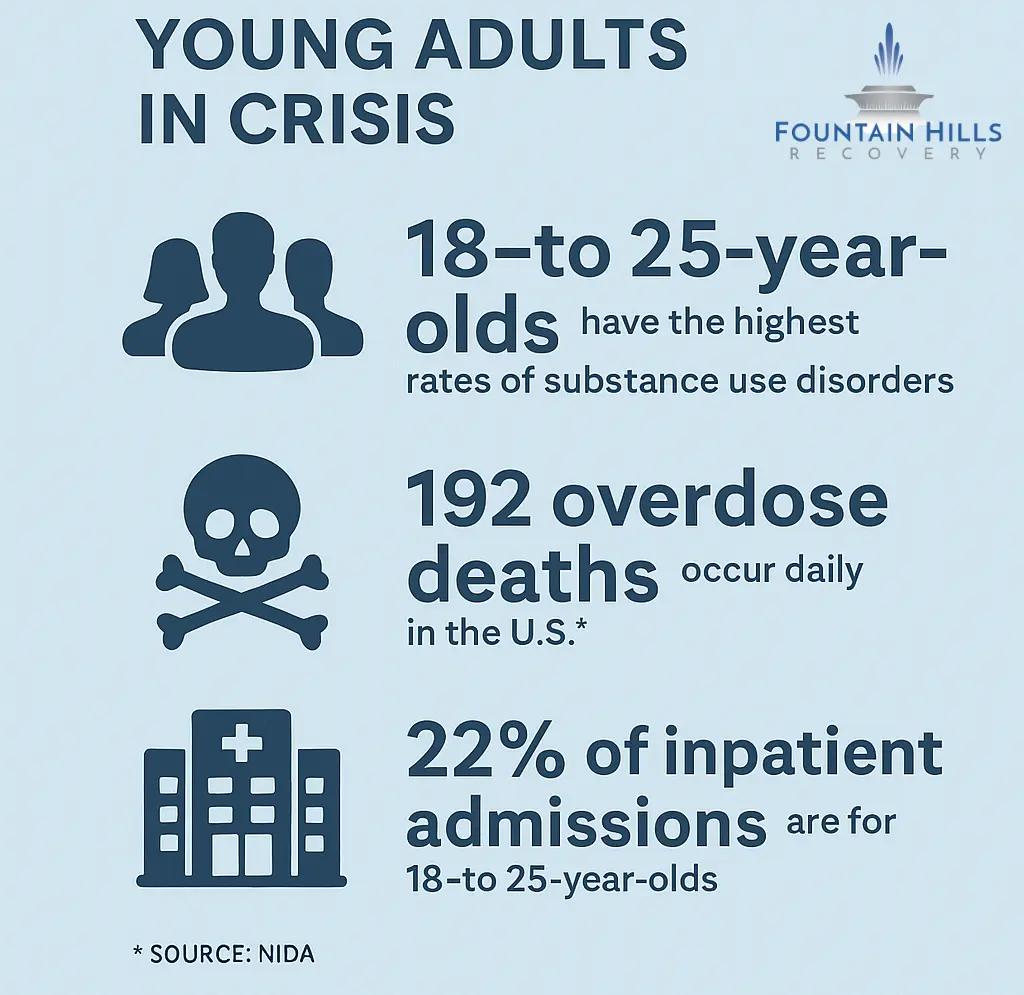When your child is spiraling—whether it’s substance use, psychosis, or emotional collapse—every second feels like a crisis. The fear is physical. You lose sleep waiting for a call you hope never comes. If you’re here, reading this, you’ve likely reached a moment of terrifying clarity: They need help. Real help. Right now.
At Fountain Hills Recovery, our inpatient drug rehab program isn’t just about treatment. It’s about building a safe container for healing—for your child and your family. Let’s walk through what that really means.
Inpatient Drug Rehab Isn’t About Punishment—It’s About Protection
Parents often come to us emotionally frayed and full of guilt. Some worry that sending their young adult to inpatient care feels like “locking them up” or giving up.
It’s not.
Inpatient rehab is a clinical response to behavioral health instability—no different than hospitalizing someone after a car accident. Your child isn’t being punished. They’re being protected.
At its core, inpatient care is about stabilizing danger, restoring dignity, and restarting communication.
Safety: The First and Most Vital Priority
Every part of our inpatient program is designed to reduce risk and create calm. That begins with:
- 24/7 supervision from trained clinical staff
- Medical and psychiatric evaluations within hours of arrival
- Secure, private campus in Fountain Hills—peaceful, distraction-free
- Immediate access to detox support, if needed
- Trauma-informed approaches that reduce shame and fear
Families often report sleeping better the first night their loved one enters inpatient care—not because things are “fixed,” but because the immediate threat has passed.
Safety gives everyone a breath.
Structure Replaces Chaos With Something Your Child Can Count On
When mental health or substance use unravels, time becomes distorted. Sleep disappears. Days blur. Inpatient care brings back structure—not as punishment, but as a neurological and emotional anchor.
At Fountain Hills Recovery, that includes:
- Consistent daily schedules for therapy, meals, activities, and rest
- Boundaried peer interactions monitored by staff
- Structured groups that build emotional regulation, self-awareness, and resilience
- Digital detox periods to reduce overstimulation and triggers
For young adults especially, returning to structure after chaos is often the first sign of internal calm.
One client said it best: “It was the first time in months my body stopped buzzing.”
Support Is Holistic—And That Includes You
Inpatient treatment isn’t just about treating the individual. It’s about understanding the family system—and the grief, fear, and hope you’re carrying too.
That’s why our program includes:
- Individual therapy with licensed clinicians who specialize in co-occurring disorders
- Psychiatric consultations with medication support when clinically appropriate
- Daily group therapy to build insight and reduce shame
- Family therapy sessions to repair ruptured communication and build future safety plans
- Discharge planning that includes aftercare coordination and relapse prevention
You’ll never be left in the dark. We believe families need real-time updates, honest conversations, and emotional support—not just status reports.
What Happens in the First 72 Hours of Inpatient Care?
Those first few days are often the hardest—for both your loved one and for you. Here’s what to expect:
- Day 1: Arrival + Assessment
A calm, non-rushed intake process. We assess medical needs, emotional stability, and immediate safety concerns. - Day 2: Orientation + Connection
Your loved one is paired with a primary therapist, introduced to the daily schedule, and gently integrated into peer support. - Day 3: Family Contact + Initial Plan
You’ll hear from our team directly. We’ll explain what we’re seeing and collaborate on next steps.
This isn’t a black box. You’ll know what’s happening—and more importantly, why.
Why Inpatient Instead of Outpatient?
Outpatient services can be life-changing—but only when the person receiving care is stable enough to participate. If your child is:
- Skipping appointments
- Using substances despite consequences
- Experiencing psychosis or delusions
- Isolating to a dangerous degree
- Becoming aggressive or impulsive
then outpatient may not be enough. In these moments, inpatient care is medically and emotionally appropriate.

Quick Comparison: Inpatient vs. Outpatient
| Feature | Inpatient Rehab | Outpatient Programs |
|---|---|---|
| Safety Monitoring | 24/7 clinical supervision | Staffed during limited session hours |
| Environment | Controlled, tech-limited, secure campus | Home environment remains unchanged |
| Therapy Access | Multiple sessions daily | 1–5 sessions weekly |
| Ideal Use Case | Crisis, severe instability, safety risk | Maintenance, step-down care |
| Length of Stay | Often 30–90 days, depending on need | Flexible but less immersive |
What If My Child Doesn’t Want to Go?
It’s one of the most painful questions parents ask: What if they refuse care?
Here’s what we recommend:
- Start with calm honesty. Avoid power struggles. Frame treatment as protection, not punishment.
- Share your fear. You’re allowed to say, “I’m scared for you, and I can’t keep you safe on my own.”
- Contact our team. We can help guide conversations or even explore intervention support if needed.
Remember: your child may not thank you right away. But keeping them safe now preserves the chance for gratitude later.
Why Fountain Hills, Arizona?
Location matters. Our rehab center is nestled in the quiet community of Fountain Hills, just outside Scottsdale. Clients often say the natural desert landscape helps them feel grounded, even before therapy begins.
And because we’re rooted in Arizona, we understand the unique cultural, familial, and environmental stressors local families face—from high college pressures to outdoor party culture and economic instability.
Healing needs context. We’re built with that in mind.
FAQ: What Parents Ask Most About Inpatient Drug Rehab
How do I know if inpatient is the right level of care?
If your child is engaging in unsafe behavior, skipping school or work, showing signs of serious mental health decline, or using substances uncontrollably, inpatient is likely appropriate. Our team can help assess during your initial call.
Will I get updates during treatment?
Yes. With appropriate consent, our clinical team provides regular updates and family sessions. We believe you deserve transparency and clarity.
What happens after inpatient rehab?
Inpatient is a starting point. Before discharge, we build an aftercare plan that may include outpatient therapy, sober living, IOP (Intensive Outpatient Program), or ongoing family support.
Can my child have their phone?
Typically, there’s a technology-free period to support stabilization. After that, supervised phone use may be allowed, depending on progress and program phase.
Is insurance accepted?
Yes, we accept most major insurance plans and will verify your benefits during the intake process. Call us at (800) 715-2004 to begin.
It’s Okay to Ask for Help
You don’t have to wait for rock bottom. You don’t have to have all the answers. You just have to reach out.
Call (800) 715-2004 or visit to learn more about our Inpatient Drug Rehab services in Fountain Hills, AZ.
Let’s take the next step—together.





